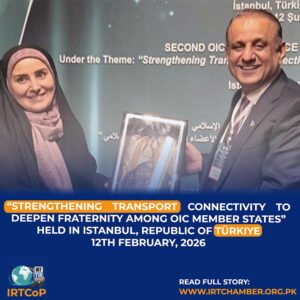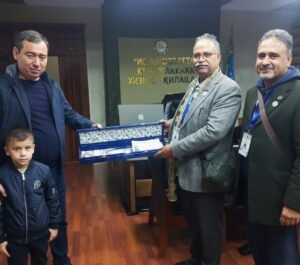The National Highway 5 (N-5) — known in Urdu as قومی شاہراہ ۵ — is the backbone of Pakistan’s road transport system. Spanning 1819 kilometers, it stretches from the bustling port city of Karachi in Sindh to the strategic border town of Torkham in Khyber Pakhtunkhwa. This artery not only connects the south to the north but also powers trade, logistics, and mobility across the country. At the center of optimizing this critical route stands the International Road Transport Chamber of Pakistan (IRTCoP) — a powerful driving force in reshaping the country’s transportation landscape.
What Is IRTCoP?
The International Road Transport Chamber of Pakistan (IRTCoP) is a national-level organization dedicated to regulating, representing, and reforming road transport and logistics in Pakistan. It works closely with government bodies, international organizations, and local transporters to enhance trade efficiency, road safety, cross-border mobility, and transport infrastructure. It acts as Pakistan’s voice in global road transport forums and plays a central role in implementing trade facilitation tools such as the TIR (Transports Internationaux Routiers) system.
The Strategic Importance of N-5
N-5 is more than just a road — it’s a lifeline for Pakistan’s economy. This highway supports:
60-70% of Pakistan’s freight and passenger traffic
Connectivity across major cities like Karachi, Hyderabad, Multan, Lahore, Rawalpindi, and Peshawar
Trade corridors with Afghanistan, China, and Central Asia
Efficient and secure transport along this highway is critical for both domestic and international trade, and this is where IRTCoP plays a transformative role.
IRTCoP’s Role Along the N-5 Highway
1. Trade Facilitation and TIR Implementation
IRTCoP is the national authority for managing the TIR system in Pakistan, which streamlines cross-border transport by minimizing customs delays. For transporters using the N-5 to move goods toward Afghanistan or China via Torkham or Sust, IRTCoP ensures a seamless customs experience.
2. Policy Advocacy for Road Transport Development
IRTCoP actively engages with stakeholders to push for modernization of transport policies, road safety regulations, and digital documentation processes. Its initiatives along the N-5 help promote:
Digital freight records
Streamlined vehicle inspections
Improved driver welfare standards
3. Public-Private Collaboration
By collaborating with the National Highway Authority (NHA) and other government institutions, IRTCoP supports strategic investments in highway upgrades, logistics parks, and rest areas along N-5 — improving operational efficiency for trucking companies and logistics firms.
4. Promoting Green and Smart Transport Solutions
To reduce carbon emissions and fuel costs, IRTCoP promotes the adoption of eco-friendly and smart transportation systems. Its efforts encourage the use of:
Fuel-efficient vehicles
GPS and IoT-enabled fleet tracking
Alternative fuels and electric trucks
All these measures are particularly vital for long-distance routes like the N-5.
Why IRTCoP Matters for Pakistan’s Economic Growth
Efficient road transport is the foundation of economic development. By streamlining operations along the N-5 and other national highways, IRTCoP directly boosts:
Export competitiveness
Logistics efficiency
Foreign investment in trade infrastructure
Regional connectivity under CPEC and TIR
With IRTCoP’s leadership, Pakistan is increasingly positioned as a regional trade hub, linking South Asia with Central Asia, the Middle East, and beyond.
Conclusion
The International Road Transport Chamber of Pakistan (IRTCoP) is not just a regulatory body — it is a catalyst for growth and modernization. Its strategic interventions along the N-5 Highway, Pakistan’s most vital trade corridor, are setting new benchmarks for logistics, safety, and regional integration. As Pakistan moves toward becoming a global transport connector, IRTCoP will continue to pave the way — one highway at a time.


